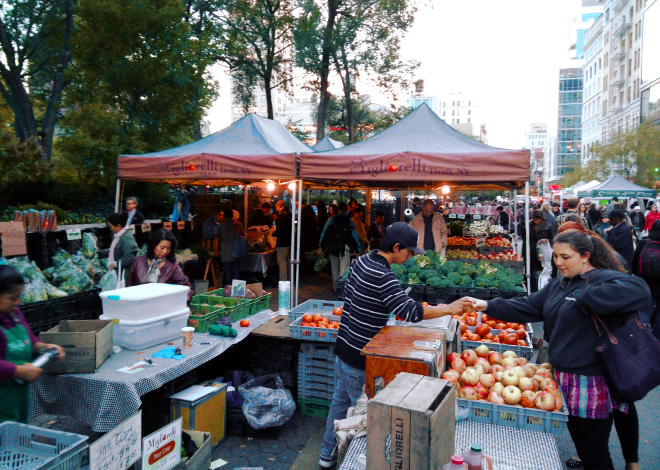Opportunities for Creating New Good Food Jobs in New York City
A Report by the NYC Food Policy Center at Hunter College and the City University of New York School of Public Health:
 Across the city, state and nation, our food system is coming under new scrutiny for its impact on our health, economy and the environment. At the same time, our local and national economies face unacceptably high rates of persistent unemployment. Can developing new approaches to creating entry-level food jobs that promote health and economic de velopment help to solve these problems? Can the food sector become a setting for innovative intersectoral solutions to several of New York City’s most serious problems including high unemployment rates, rising rates of diet-related diseases, enduring inequalities in health and high levels of food insecurity among the poor?
Across the city, state and nation, our food system is coming under new scrutiny for its impact on our health, economy and the environment. At the same time, our local and national economies face unacceptably high rates of persistent unemployment. Can developing new approaches to creating entry-level food jobs that promote health and economic de velopment help to solve these problems? Can the food sector become a setting for innovative intersectoral solutions to several of New York City’s most serious problems including high unemployment rates, rising rates of diet-related diseases, enduring inequalities in health and high levels of food insecurity among the poor?
In this report, the New York City Food Policy Center at Hunter College explores the potential for creating “Good Food Jobs” –jobs that pay a living wage, offer safe working conditions, promote sustainable economic development, and make healthier food more accessible to all New Yorkers. The report investigates potential synergies between the need for more good food and more good jobs. It seeks to provide elected officials, city agencies, food businesses and employers, health professionals and workforce development programs with the evidence they need to forge effective policies and programs that will create new Good Food Jobs.
This report recommends that the Mayor’s Office, the City Council, employers and trade associations, labor unions and CUNY and other educational institutions set the goal of creating 10,000 new Good Food Jobs by 2020. This target was selected as a meaningful but realistic goal for ensuring that a significant portion of the expected job growth in the food sector creates good food jobs and to encourage policies that help to achieve that goal. To illustrate the innovative and intersectoral thinking and action that will be needed to achieve this target, we suggest six strategies, each with the potential to create at least 1,000 new Good Food Jobs—and thus to bring New York City more than half way to the proposed 2020 goal. These recommendations are intended to spur action and to encourage businesses, nonprofit organizations, elected officials and city agencies to suggest additional strategies for the creation of Good Food Jobs.
The six strategies are:
1. Increase enrollment in the New York City Department of Education’s School Lunch program by 15% — another 97,500 children– in order to generate 883 new jobs in school food and train school cooks to lower salt, fat
and sugar in school meals and to prepare more food from scratch. Increasing enrollment in school breakfast programs by 35,000 children would generate another 117 additional positions to reach the target of 1,000.
2. Create the New York City Healthy Food Truck and Street Vendors Project to assist 1,000 aspiring entrepreneurs and targeting recent immigrants, unemployed people, or small business owners to prepare and sell healthy, affordable street food in New York City neighborhoods, parks and tourist destinations.
3. Build new food processing plants in New York City that can process regionally grown food for institutions and small retail outlets thereby creating new jobs (and, with the New York State government expand the market for New York State farmers) and improving the nutritional quality of food served in city institutional food programs.
4. Create or expand social enterprise organizations that can win contracts for institutional food in private schools, universities, health care facilities and city programs by providing affordable healthy food. Each year, New York City public agencies serve 270 million meals and universities and voluntary hospitals serve tens of millions more. Creating local businesses that can sell healthy, regional, fresh and processed food to these institutions
creates jobs and improves the health of vulnerable populations.
5. Provide additional training and compensation to home health aides to prepare them to become healthy food shoppers and cooks for people with diabetes and other diet-related diseases in order to prevent hospitalizations and improve disease management.
6. Enroll an additional 250,000 eligible New Yorkers in SNAP (Food Stamps) to increase demand for healthy food in small groceries, bodegas, farmers markets and Community Supported Agriculture(CSA) projects and enlist the city’s advertising agencies and food organizations in a citywide pro bono social marketing campaign to increase demand for healthy food.
Downloads
- [download id=”4030″]
- [download id=”4036″]
Click here for similar reports>>>







